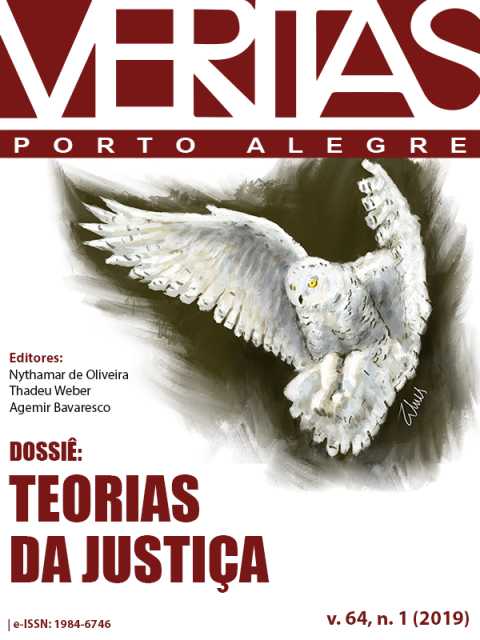Recognition, religion and secularism in Charles Taylor
DOI:
https://doi.org/10.15448/1984-6746.2019.1.30758Keywords:
Recognition. Secularism. Religion. Charles Taylor.Abstract
The article aims to investigate, in the light of the philosopher Charles Taylor, the question of recognition of the subjects from the relation between secularism and religion. The guiding principle of Taylor’s thinking is communitarianism. This one is related to the idea that the context of the norms that govern a society must be that of a community which in its values, practices and institutions form a constitutive horizon for the identity of its members. Only this way it would be possible to consider the questions of justice and then to answer about what is good and what should be worth for the community. According to Taylor, men are expressive beings because they belong to a culture that is nurtured and transmitted within a community. Taylor starts from the hegelian critique of the Kantian formalism which displaced the subject from the community, from history and from culture, generating demands for recognition. he emphasizes that religion, for example, is still related to the formation of several identities, just as an essential sphere in the constitution of subjects, even in secularized societies. Taylor emphasizes the existence of multiple modernities, once non-Western cultures were modernized in their own way, without the necessary separation between secularized and religious identities. Taylor advocates a redefinition of secularism which values religions as essential and indispensable sources for diverse subjects who have formed from other languages, cultures and traditions, different from the traditional conception of secularism. how, then, to think about the question of recognition, within the framework of the relationship between secularism and religion?Downloads
References
ARAÚJO, P. Charles Taylor: para uma ética do reconhecimento. São Paulo: Loyola, 2004.
BERGER, P. Os múltiplos altares da modernidade: rumo a um paradigma da religião numa época pluralista. Petrópolis: Vozes, 2017a.
BERGER, P. O Imperativo Herético: possibilidades contemporâneas da afirmação religiosa. Petrópolis: Vozes, 2017b.
BINJA, E. Multiculturalismo: a identidade do sujeito nas tensões sociais contemporâneas em Charles Taylor. São Paulo: Editora LiberArs, 2015.
HABERMAS, J. O discurso filosófico da modernidade. São Paulo: Martins Fontes, 2002.
HEGEL, G. W. F. Fenomenologia do Espírito. 4. ed. São Paulo: Vozes, 2007.
HEGEL, G. W. F. Filosofia do Direito. 3. ed. São Paulo: Loyola, 2010.
LÖWITH, K. De Hegel a Nietzsche: a ruptura revolucionária no pensamento do século XIX. Marx e Kierkegaard. São Paulo: Unesp, 2014.
OLIVEIRA, M. Ética e Sociabilidade. 3. ed. São Paulo: Loyola, 2003.
RAWLS, J. O liberalismo político. São Paulo: Martins Fontes, 2011.
RICOEUR, P. O Si Mesmo como um Outro. Campinas: Papirus Editora, 1991.
TAYLOR, C. Multiculturalismo: examinando a política de reconhecimento. Lisboa: Instituto Piaget, 1994. DOI: https://doi.org/10.2307/j.ctt7snkj
TAYLOR, C. Argumentos Filosóficos. São Paulo: Edições Loyola, 2000.
TAYLOR, C. Hegel e a Sociedade Moderna. São Paulo: Edições Loyola, 2005.
TAYLOR, C. Uma era secular. São Leopoldo: Unisinos, 2010a.
TAYLOR, C. Imaginários sociais modernos. Lisboa: Edições Texto & Grafia, 2010b.
TAYLOR, C. Why We need a radical redefinition of secularism. In: MENDIETA, E.; VANANTWERPEN, J. (ed.). The power of religion in the public sphere. New York: Columbia University, 2011a. p. 34-59.
TAYLOR, C. A ética da autenticidade. São Paulo: Realizações Editora, 2011b.
TAYLOR, C. O que significa secularismo? In: ARAÚJO, L.; MARTINEZ, M.; PEREIRA, T. (org.). Esfera pública e secularismo: ensaios de filosofia política. Rio de Janeiro: UERJ, 2012. p. 157-195.
TAYLOR, C. As fontes do self: a constituição da identidade moderna. 4. ed. São Paulo: Edições Loyola, 2013.
TAYLOR, C. Hegel: sistema, método e estrutura. São Paulo: Realizações Editora, 2014.
WALZER, M. Da Tolerância. São Paulo: Martins Fontes, 1999.
Downloads
Published
How to Cite
Issue
Section
License
Copyright
The submission of originals to Revista Veritas implies the transfer by the authors of the right for publication. Authors retain copyright and grant the journal right of first publication. If the authors wish to include the same data into another publication, they must cite Revista Veritas as the site of original publication.
Creative Commons License
Except where otherwise specified, material published in this journal is licensed under a Creative Commons Attribution 4.0 International license, which allows unrestricted use, distribution and reproduction in any medium, provided the original publication is correctly cited. Copyright: © 2006-2020 EDIPUCRS</p






